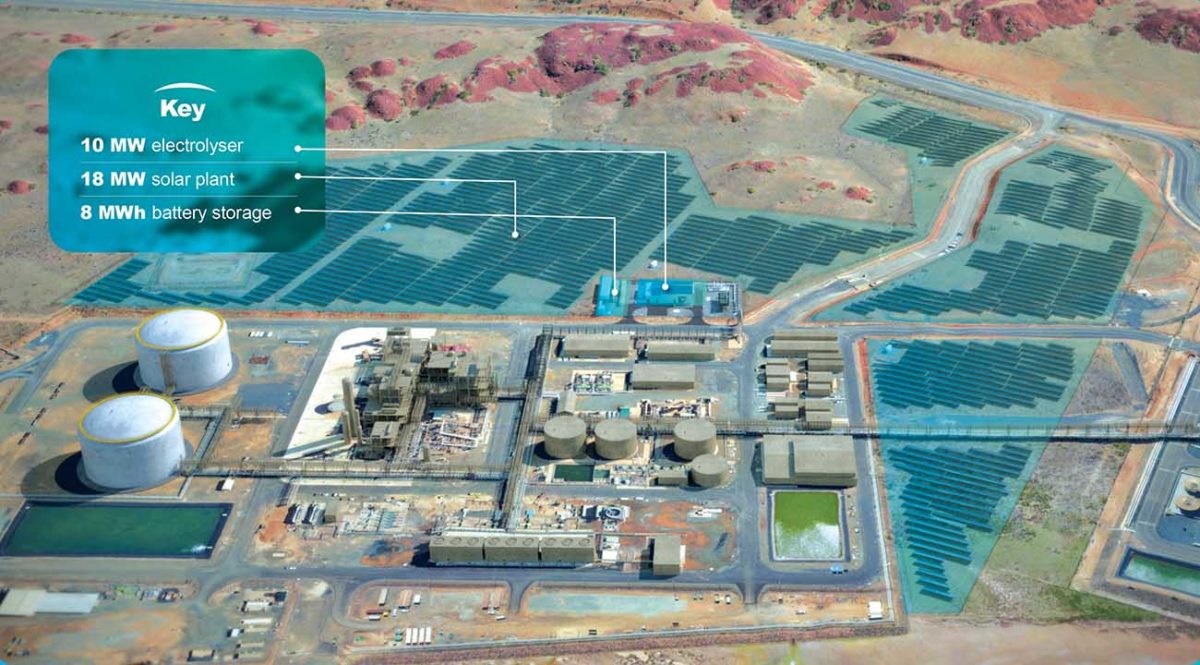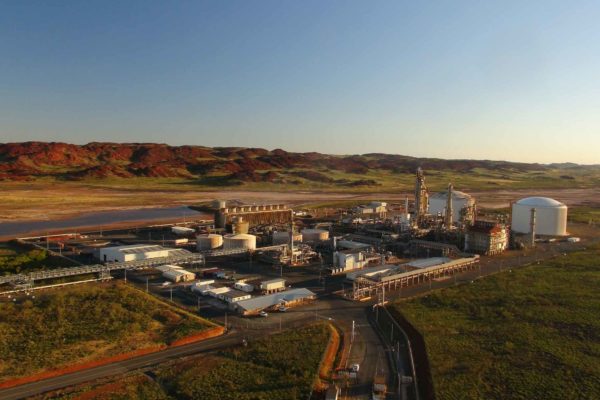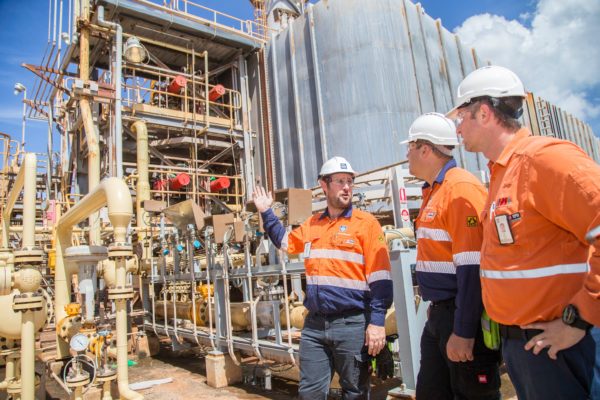
Graphic representation of the Yuri project, to be built adjacent to the existing Yara Pilbara Fertiliser plant
Image: Engie
There is almost a daily announcement about a major green hydrogen project being built somewhere in the world. Hydrogen and ammonia can be made from fossil fuels but also from renewable energy and water using an electrolyser producing zero carbon emissions. It is critically important that we can tell when it is zero emissions and prevent ‘greenwashing.’
Yara operates the world’s largest global ammonia network, including a world scale ammonia production facility in the Pilbara, Western Australia. In an effort to meet the growing market for green, zero carbon ammonia, Yara is collaborating with Engie to build a green ammonia plant adjacent to its existing fertiliser plant in the Pilbara.
Stage 1 of the Yuri project, as it’s named, will see a 10 MW industrial scale electrolyser installed beside an 18 MW solar plant capable of producing 600 tonnes of green ammonia each year. The biggest electrolyser currently operating in Australia is 1.25 MW at Tonsley Park in Adelaide.
 Yara’s existing ammonia plant in the Pilbara.
Yara’s existing ammonia plant in the Pilbara.
Image: Yara
Hydrogen and ammonia can be made through a number of different production pathways. In addition, the supply chain from raw materials and energy all the way to end-consumer can involve many steps. The resulting carbon footprint of the hydrogen and its derivatives being consumed can therefore also vary significantly, depending not only on things like the origin of the energy and the feedstocks, but also on the methodology used for the calculation.
There is currently no detailed, widely-agreed definition of what exactly constitutes “green/blue/low-carbon/etc” hydrogen. So far, most people have been relying on different colours to differentiate between different kinds of clean hydrogen, but there are increasing calls and efforts for a more transparent and robust classification based on the specific carbon footprint of the product.
Developing such a methodology, and harmonising standards across countries and markets is critically important so that all stakeholders can make informed decisions based on facts, rather than risk falling victim to greenwashing claims.
 Green hydrogen is expected to be supplied to the Yara ammonia plant in 2024.
Green hydrogen is expected to be supplied to the Yara ammonia plant in 2024.
Image: Yara
In December 2020, Hydrogen Australia (a division of the Smart Energy Council) launched its Zero Carbon Certification Scheme for renewable hydrogen, renewable ammonia and renewable metals. A world leading scheme to provide a guarantee of origin for hydrogen produced from 100% renewable energy and with zero carbon emissions.
Smart Energy Council engaged Bureau Veritas, a world leader in laboratory testing, inspection and certification services to undertake a pre-certification audit of the planned green ammonia plant.
Following a detailed engineering assessment and analysis, Bureau Veritas concluded that the ammonia plant can produce ammonia and hydrogen with carbon footprints of 0.109 kgCO2-e/kgNH3 and 0.26 kgCO2-e/kgH2, respectively. The Smart Energy Council considers this level of embedded carbon de minimis and able to be certified as Zero Carbon Renewable Ammonia. When the facility is commissioned there will be a further audit to verify that the plant has been built according to plans and specifications to achieve these standards.
“This certification will provide guarantees to Yara’s customers in Asia, Australia or Europe that the quantities supplied have been produced according to set standards and will inform the customers about key attributes such as renewable origin and greenhouse gas footprint,” Magnus Ankarstand, President of Yara Clean Ammonia, said.
The Zero Carbon Certification Scheme is backed by some of the biggest green hydrogen companies in world, the German Energy Agency, state governments of Victoria, Western Australia and Queensland, the Australian Capital Territory and the Ammonia Energy Association.
The first project certified under the scheme was the ActewAGL green hydrogen refuelling station in Fyshwick, Canberra. The German Energy Agency (DENA) and the Green Hydrogen Catapult are advisors to the scheme.
“Smart Energy Council’s scheme is important because it will enable hydrogen and related products to be certified as zero emissions. It is critical that we can track how these products are manufactured so customers can be certain that the product they select is genuinely zero emissions,” John Grimes, CEO Smart Energy Council, said.
The world is now rapidly moving to decarbonise and urgently needs zero carbon products such as renewable ammonia. Zero carbon certification is an imperative to establishing new markets with integrity and to give investors the confidence to make the leap forward.
About the authors:
Scott Hamilton is Senior Advisor at Hydrogen Australia (a division of Smart Energy Council)
Emile Herben is Product Manager, Yara Clean Ammonia.
About Yara Clean Ammonia
Yara grows knowledge to responsibly feed the world and protect the planet. Yara Clean Ammonia is uniquely positioned to enable the hydrogen economy in a market expected to grow substantially over the next decades. We aim at significantly strengthening our leading global position as the world’s largest ammonia distributor, unlocking the green and blue value chains, and driving the development of clean ammonia globally.
Building on Yara’s leading experience within global ammonia production, logistics and trade, Yara Clean Ammonia works towards capturing growth opportunities in low-emission fuel for shipping and power, carbon-free food pro-duction and ammonia for industrial applications.
Yara Clean Ammonia operates the largest global ammonia network with 12 ships and has access to 18 ammonia terminals and multiple ammonia production and consumption sites across the world, through Yara. Revenues and EBITDA for the last 12 months were USD 3,638 million and USD 172 million respectively as per Q2 2022. Yara Clean Ammonia is headquartered in Oslo, Norway.
About Smart Energy Council
The Smart Energy Council is the peak industry body for solar, storage and smart energy in Australia. Founded in 1954, today the Council is a not-for-profit public company limited by guarantee. We have over 1000 members nationwide, including solar and storage manufacturers, distributors, retailers and installers, renewable energy project developers and investors, academics, analysts and consultants. The Smart Energy Council is also responsible for the delivery and development of the Zero Carbon Certification Scheme, through its division Hydrogen Australia, from 2020.
More information
For interviews and more information, contact Mr. Wayne Smith at Smart Energy Council on 0417 141 812




